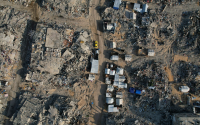17 January 2006Ed Stoddard and David Mageria
East Africa is gripped in drought while the south is blessed with rain.
But as aid agencies scramble to feed millions across the world's poorest continent it is by no means clear what the 2006 harvests will bring, even in areas that have been wet.
Good rains have been reported so far this season over much of Zambia, Malawi and Zimbabwe.
But with around 12 million people in the region in need of food aid until the April harvest, aid workers warily recall that drought only started searing the region at this time last year.
"It's too early to tell if there will be any impact from these rains on the 2006 crop in southern Africa," said Mike Huggins, a spokesman for the World Food Programme.
"Last year in countries like Malawi the drought struck in the later half of January and February so everything that had grown up to that point shrivelled," he said.
Other sources report that pests such as army worms are devouring crops in Zimbabwe and Malawi, though the problem does not appear widespread at this stage.
"Of an estimated 1 million hectares of maize planted in Malawi it looks like army worms have affected about 20,000 hectares," said one aid worker.
Regional breadbasket South Africa has seen good rain over much of its maize belt this month though for some farmers they may be too late after a relatively dry start to the seasson.
WFP has indicated that it plans to source about $80 million in food supplies, mostly maize, from South Africa this year.
Farmers are expected to have planted 1.61 million hectares of maize when the Crop Estimates Committee releases its preliminary estimate on Thursday, according to a Reuters consensus forecast of eight banks and trading houses.
This is far less than the 2.93 million hectares sown last year but more than enough for local needs if last year's carryover of an estimated 2.6 million tonnes of white maize is factored in.
...WHILE EAST BAKES
Southern Africa can be grateful for its rainfall as crops and grazing lands elsewhere wilt under a harsh sun.
The east African countries of Kenya, Somalia, Ethiopia, Eritrea, Tanzania and Burundi face a worsening drought in what aid agencies say could be "a humanitarian catastrophe". The WFP says 5.4 million people need food aid there.
Analysts said the drought had not badly affected cash crops in the region but warned that if rains continue to fail, production for coffee and tea could be hurt.
Worryingly, droughts could become more common because of climate change linked to global warming.
"Temperatures globally are rising and drought cycles are more frequent," Prof Levi Akundabweni, dean of the faculty of agriculture at the University of Nairobi, told Reuters.
"The environment is challenging us to devise coping mechanisms, to learn more so as to be able to understand the enormity of the problem."
The impact has been worst in Kenya, east Africa's biggest economy, where dozens of people and livestock have died while malnutrition has worsened among pastoral communities.
"The emergency we face in the Horn of Africa today is the result of successive seasons of failed rains," said Holdbrook Arthur, WFP Regional Director for Eastern and Central Africa.
"Consequently, pastoralists living in these arid, remote lands have very few survival strategies left and desperately require our assistance until the next rains," he said.
Anarchic Somalia is headed for the worst cereal harvest in a decade, according to the WFP.
Ethiopia, which pulled the world's heart strings during an appalling famine two decades ago, has 1.75 million people in need of emergency food aid, adding to 5.5 million already getting food shipments.
And in West Africa, WFP said on Monday it needed $240 million to feed at least 10 million people this year.
Several countries in West Africa suffered shortages last year after crops were ravaged by drought and locusts. In Niger, the worst affected, aid groups scrambled to tackle a food crisis affecting more than 3 million people.
But Mother Nature is not the only source of Africa's woes.
A raging AIDS pandemic, soil erosion from poor farming practices and conflict have all conspired to create hunger on a continent which is covered in many areas with a rich soil.
Africa has also missed out on much of the "Green Revolution", a global effort to boost staple crop yields which has focused on wheat, rice and maize. Only the latter is widely grown in Africa but it is not very resistant to drought.
And American economist Jeffrey Sachs pointed out that while Africa has its fertile regions, much of the continent has erratic rainfall and few large rivers for irrigation.






